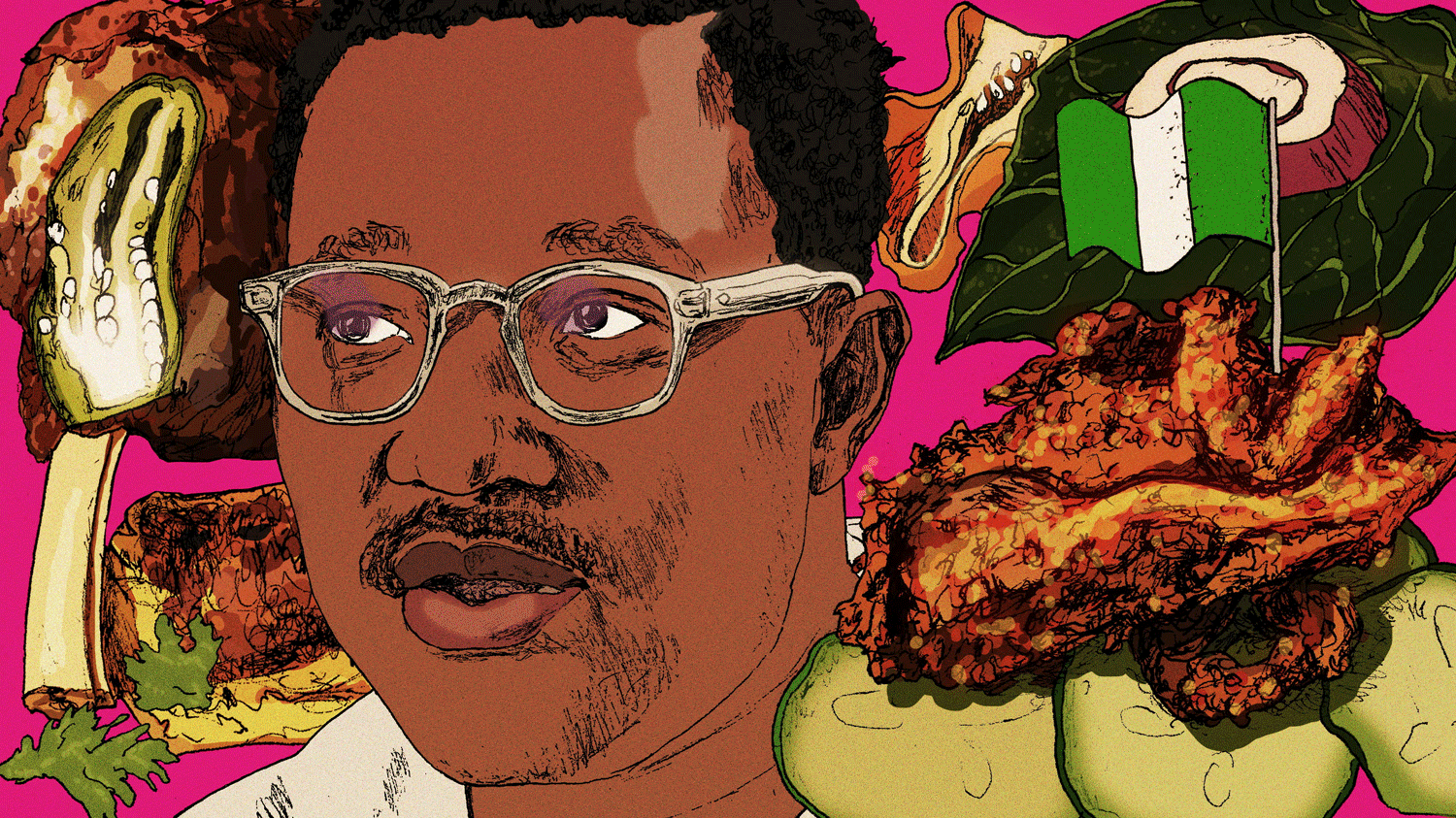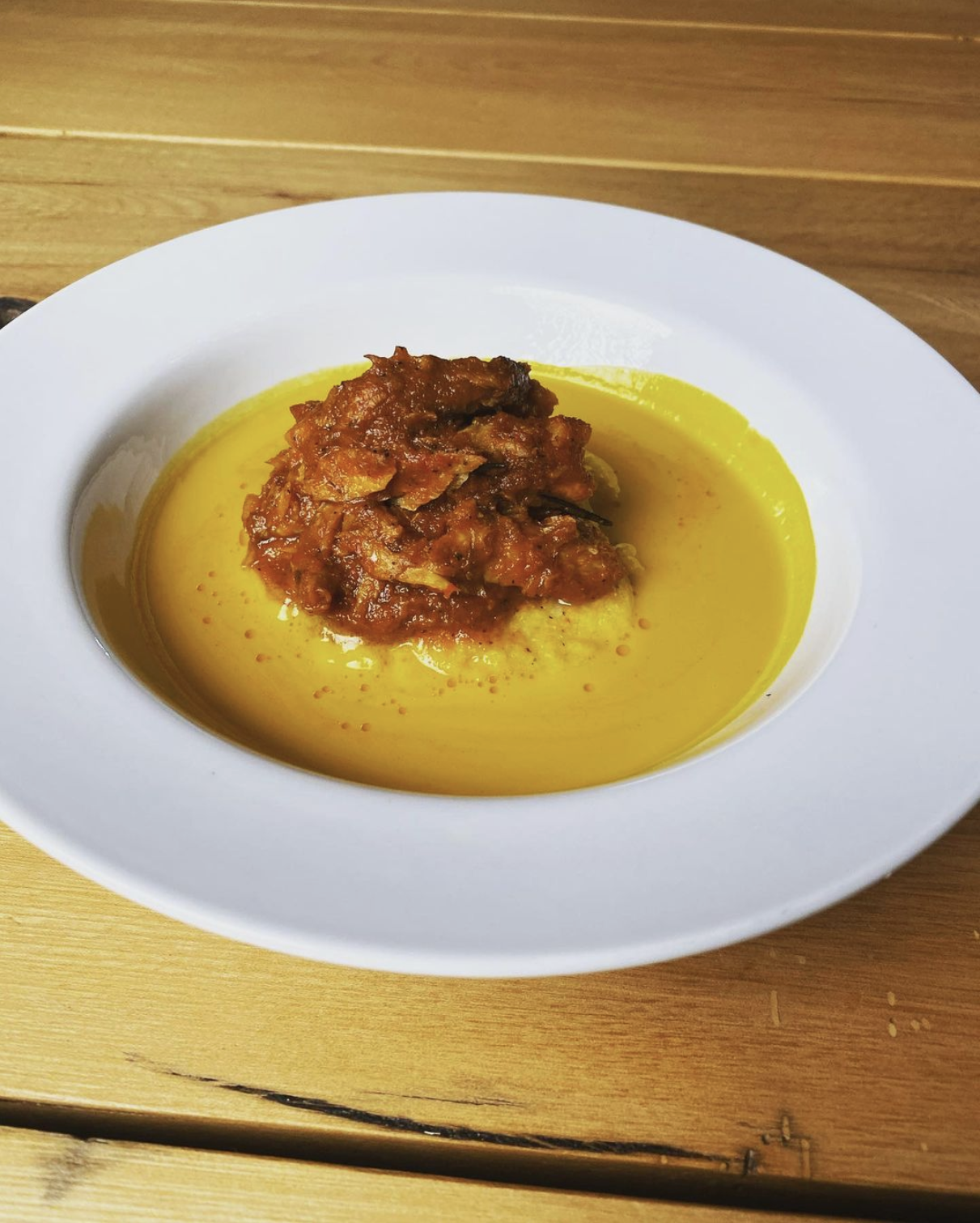
A night with the Brooklyn chef merges African food, music, and spice.
Ayo Balogun loves dinner parties, so much so that he throws them several times per week—and he does it for complete strangers. You’d be understandably mistaken if you thought the venue where he hosts these parties was his living room, the walls of which are crammed with oversize photos of his parents, his uncle, and other family members. It’s actually his Brooklyn restaurant, Dept of Culture, a 15-seat, single-room space that consists of a giant communal table and a kitchen near the intersection of Nostrand Avenue and Quincy Street in the Bedford-Stuyvesant neighborhood.
Chef Balogun, a native of Kwara, Nigeria, opened Dept of Culture in January 2022, and it’s had a consistent and profound presence in the NYC dining scene ever since, earning a James Beard Award nomination for best new restaurant in the country. In summer 2023, he opened a second restaurant in adjacent Clinton Hill, Radio Kwara, and it is equally impressing the Brooklyn dining cognoscenti with its warm hospitality and well-executed West African fare.
In the beginning, Balogun wasn’t sure if his experiment was going to work or not. “See that coffee station over there?” he asked, when I met up with him one morning last year at Dept of Culture. He was pointing to a coffee machine with a few scattered mugs around it. “That’s not for diners. That’s for me.” He said that, in the beginning, he would have been happy if three people per night showed up. “I figured I would just cook for three people, making the best Nigerian food and listening to the best Nigerian music on the record player,” he said. “And then, for the rest of the time, I could just drink my coffee.”

If you stop and think about the origins of Dept of Culture, it reads like a cautionary tale: an immigrant chef who has worked in New York restaurants for two decades but who didn’t go to culinary school decides he wants to open a restaurant serving a cuisine most people outside of West Africa are unfamiliar with. The new place will lean more fine dining than casual and to make it more of a challenge, he has only two other employees: a host and a dishwasher. Serving 30 people per night over two seatings, he cooks a four-course prix fixe dinner with just a small convection oven and two induction burners. The land mines are both hidden and fully in view.
The first night, only a few people turned up. But then something interesting happened: on the second night, there were a few more, and on the following evening, a few more than that. “And I was like, ‘How did they know?’” he said in a whispered tone. “After the first week, we were perpetually full. I am not sure how that happened.” What we know: It didn’t happen because of social media. Balogun said he only had about 100 followers on Instagram during Dept of Culture’s initial opening (the Dept of Culture Instagram account now has over 18,000 followers).
When I dined at Dept of Culture, Balogun wasted no time in stepping up to our table within a few minutes of us taking our seats. “I’m from the state of Kwara in northwestern l Nigeria,” he said to the 15 diners in the house, as his dishwasher and host were placing bowls of goat pepper soup in front of us. “For most Nigerians, Kwara is like the state of Delaware: it’s just a place you cross through to get from one place to another.” He paused, and the sound of god-level Nigerian singer Fela Kuti broke through from the record player. “I will continue to interrupt throughout the night, so please bear with me.” The chef took a slight bow and then stepped back into the kitchen.

Uwo ati gbegiri ati eja alaran – dried fish, soft yam, and a corn puree.
The ata rodo pepper in the soup, served in an ivory-white bowl that was like an upside-down wide-brimmed hat, made my tongue tingle, while the minerality of the goat lingered on the back of my palate. Throughout the room I could hear murmurs of satisfaction and the occasional “wow” as others slurped from their oversize spoons.
I could now see how the restaurant had caught the attention of New York diners so quickly. It happened not only because Balogun is a formidable culinary talent but because he takes a completely different approach to restaurant dining, making Dept of Culture one of NYC’s most special places to book a table.
Perhaps it’s just a matter of hitting the zeitgeist straight in the bull’s-eye. Dept of Culture and Radio Kwara both seem like post-pandemic social experiments, sticking a handful of strangers at a communal stable in a small room after a couple of years when we were warned on a daily basis that doing such things would be seriously harmful to our health.
One of the earliest reviews of Dept of Culture appeared in the New Yorker in February 2022. “After two years of social distancing, banqueting on pounded yam and delectably salty mackerel alongside unmasked strangers still feels slightly indecent, if undeniably wonderful,” wrote David Kortava.
When I asked former Eater New York restaurant critic Ryan Sutton, who had also penned an early review, about his experience at Dept of Culture, his enthusiasm remained strong. “Is there really any other local restaurant where you feel like you’re attending a small gallery opening on any given night?” Sutton said. “And the chef keeps talking as you’re eating, as if he too believes he’s at a gallery show in Chelsea and not a restaurant that he’s running.
And honestly, that’s okay, because it’s a heck of an evening. Of course, an added element was the fact that you were all at a communal table, a once-maligned form of seating that somehow felt kind of magical when I went, about a year into the vaccine era, when folks were only starting to get comfortable being close to strangers again, be it on the subway or in the theater. In that regard, Dept of Culture got the ball rolling a bit faster for those lucky enough to dine there.”
In his own words, Balogun agrees that the format works on many levels. “When you come here, you don’t know who you’re going to sit next to. It doesn’t matter how rich or important you are or what your background is. Everyone gets to sit down and eat the same thing. Dept of Culture is a tasting menu—rich and famous or not, diners here all have to eat the same thing. You don’t have a choice, just like everyone else. For a couple of hours, we’re all equal. There’s a beauty to that. I think people like it because it creates a community, which is important after the pandemic.”

But it goes beyond making people from different socioeconomic backgrounds sit next to one another for two hours. On the night that I dined at Dept of Culture recently, I got to see the unique dynamic firsthand. I was seated at a corner of the communal oak table, which Balogun foraged from an abandoned barn in Upstate New York. The solo diner on my left worked at a hedge fund and lived in Tribeca; the couple to my right were artists from Bushwick. They’d all heard the buzz about Dept of Culture and wanted to see (and taste) it for themselves.
About 20 minutes after we finished the goat pepper soup, Balogun stepped up to our table again.
“The Fulani tribe makes this cheese,” he told our group of diners, as his two colleagues put down bowls of Wara cheese topped with a thick obe ata sauce. “A long time ago, the Fulani tribe came to Kwara. They conquered us, and they forced us to eat cheese which is made with unpasteurized milk. During the pandemic, I got the urge to make Nigerian food. I ended up in Connecticut one day, and I learned that when you go 15 minutes out of any big city in America, things get odd really quickly. Driving through the Connecticut countryside, I began seeing signs for raw milk. In New York state, it’s illegal to sell unpasteurized dairy. Yet you can get weed on every block here! Maybe we need to change just one more law: We don’t want all the good chefs to be in prison. Also, no one is going to believe that you went to prison for milk.”
And that’s what we were all digging our spoons into at that moment. A soft, creamy cheese made with unpasteurized cow’s milk from Connecticut. The red pepper obe ata sauce was spicy on the palate, until a sweetness emerges from the raw milk cream, cutting the heat from my palate .
Similar to his vast Nigerian record collection, which he spins during dinners, when Balogun can’t find ingredients close to home, he relies on people sending him packages from Nigeria. This is an inconsistent method, though, so he’s recently started growing West African herbs in the basement of Radio Kwara. “In the way that people grow weed in their houses,” he said, “that’s what I’m doing with herbs for the two restaurants.” On the day that I talked to him, he was particularly excited about the scent leaf that’s cropping up in his basement, an essential herb for pepper soup.
When Ayo Balogun was 20 years old, he arrived in New York City in the late 1990s from Nigeria to live with his uncle in the suburbs. He ended up working in restaurants in Manhattan, including Gobo, a high-end vegan spot in Greenwich Village; La Palapa, a Mexican restaurant a block away; and the fine-dining-leaning 202 and Atrium in the Meatpacking District. In 2013, he opened a café in Bed-Stuy called the Civil Service Café, which incarnated into the Council, which eventually became a pop-up restaurant called Trade Union Café—all of which have government monikers, as if they were named by a mid-level bureaucrat in the Communist Party in the Soviet Union. It was at these cafés and restaurants that Balogun began incorporating Nigerian ingredients into dishes, adding red-pepper-spiked obe ata sauce to egg sandwiches, for example, and serving up varieties on the theme of pepper soup at his pop-up dinners.
He said he also learned the ethics of hard work, particularly at Gobo. “They wanted me to work in the front of the house too. And I ended up loving that, waiting tables and interacting with diners,” he said. “You could say that’s how I got the idea to have a restaurant with no barrier between the kitchen and the dining room, so I can easily move between the two.”
He was also inspired by the time he worked in the kitchen at the now-shuttered Chelsea restaurant Bombay Talkie, where chef Sunitha Ramaiah cooked dishes from her childhood growing up in Bombay. “That restaurant had a warmth about it, and sometimes, even when you think you’re not learning anything, you’re actually learning. I wanted to bring the sensibility of me to Dept of Culture, and the best way to do that is to tell my story—the way food was presented to me at home.”
Speaking of which, when we got to the third course in my dinner at Dept of Culture, Balogun stood in front of us as his two colleagues served us plates. The next course was pounded yam with egusi, a mixture of fermented locust beans, fermented melon seeds, palm oil, dried catfish, and efo, or Nigerian spinach.
“This dish is basically old people’s food in Nigeria,” Balogun said. “This is a dish that reminds me of when I was 11 years old. I had just seen the movie Boyz n the Hood, and I decided I was going to start acting like Ice Cube. My parents didn’t like this. So I had to spend a summer in exile: my parents sent me to my grandparents’ house for the summer. Part of my sentence was that I had to cook all summer, and my grandparents ate this dish every day. But when you get to know a dish so intimately—as I did starting at age 11—you can start improving upon it. This is my take on it.”
I don’t know how much he deviated from his grandparents’ taste in pounded yam, but Balogun’s dish was funky. The fish and the various herbs created a delicious cacophony on the taste buds, and the yam provided a smooth, melodic texture in the mouth—like a Charles Mingus tune morphing into a Prince ballad.
“I had just seen the movie Boyz n the Hood, and I decided I was going to start acting like Ice Cube.”
We’re living in an era of dining in which it has become almost rote to hear about where your chicken came from, what farm your kale was grown on, and how many miles away your coffee was roasted. But Balogun is flipping that on its head by telling diners about where he comes from.
He also likes to emphasize the commonalities each culinary culture has, and sometimes his diners do this work for him. Recently, a Russian woman ate a spoonful of pounded yam with egusi and remarked, “This tastes just like something my grandmother would make for me in Russia!” It was an entirely different part of the world. Balogun said: “It makes me realize that we’re all the same people scattered around the world, spending time with the people we love. In the end, we’re all the same people.”
For his next act, Radio Kwara, Balogun wants a similar vibe to Dept of Culture but maybe even more relaxed. “The menu emphasizes small plates—‘small chops,’ we call them in Nigeria.” He’s aiming for it to be a neighborhood spot where people can pop in to have a snack and a beer. “Like a buka,” he adds, referring to the near-ubiquitous tavern-style spots in his home country. He also intends to invite other African chefs and chefs from other regions in Nigeria to do short residencies at Radio Kwara.
“I’m not worried about what Eater or the New York Times says. I was worried that the Nigerians here would hold me accountable.”
“When I had my own coffee place and a café, I was always doing Western-leaning food,” he said. “But when I thought about opening a Nigerian restaurant, I had a fear of criticism from Nigerians. I’m not worried about what Eater or the New York Times says. I was worried that the Nigerians here would hold me accountable.”
In fact, a handful of Nigerians are in attendance at Dept of Culture and Radio Kwara every week. Has Balogun won them over? “Nigerians often thank me for representing Nigeria,” he said. “They’ve given me some very positive feedback.” Recently, Sola Yomi-Ajayi, the Nigerian-born CEO of United Bank for Africa, offered Balogun a gig cooking breakfast at the United Nations. He couldn’t do it, but he was honored. “She first thanked me for what I’ve done for Africa, then she said she’d emailed the restaurant back in March about cooking at the UN and no one responded. I guess if we’ve won her approval, then that’s pretty great.”